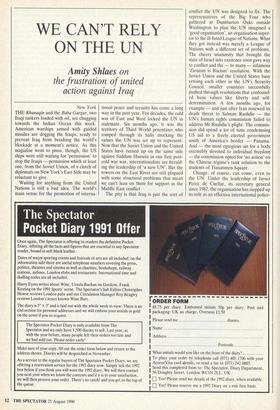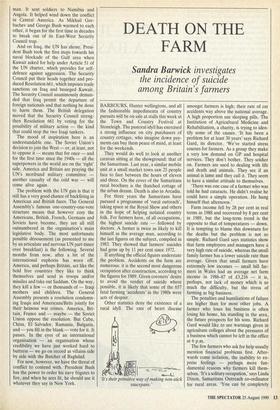WE CAN'T RELY ON THE UN
Amity Shlaes on
the frustration of united action against Iraq
New York THE Khanaqin and the Baba Gurgur, two Iraqi tankers loaded with oil, are chugging towards the Indian Ocean this week. American warships armed with guided missiles are dogging the Iraqis, ready to prevent Iraq from breaking the world's blockade at a moment's notice. As this magazine went to press, though, the US ships were still waiting for 'permission' to stop the Iraqis — permission which at least one, from the Soviet Union, of a clutch of diplomats on New York's East Side may be reluctant to give.
Waiting for anything from the United Nations is still a bad idea. The world's main venue for the promotion of interna- tional peace and security has come a long way in the past year. For decades, the cold war of East and West locked the UN in stalemate. Six months ago, it was the territory of Third World potentates who romped through its halls mocking the values the UN was set up to represent. Now that the Soviet Union and the United States have turned up on the same side against Saddam Hussein in our first post- cold war war, internationalists are herald- ing the leadership of 'a new UN'. But the towers on the East River are still plagued with some structural problems that mean we can't lean on them for support in the Middle East conflict.
The pity is that Iraq is just the sort of
conflict the UN was designed to fix. The representatives of the Big Four who gathered at Dumbarton Oaks outside Washington to plan the UN imagined a `good organisation', an organisation super- ior to the ill-fated League of Nations. What they got instead was merely a League of Nations with a different set of problems. The cheery unanimity that brought the state of Israel into existence soon gave way to conflict and the — to many — infamous `Zionism is Racism' resolution. With the Soviet Union and the United States busy vetoing each other in the UN's Security Council, smaller countries successfully pushed through resolutions that confound- ed basic values like liberty and self- determination. A few months ago, for example — and just after Iran renewed its death threat to Salman Rushdie — the UN's human rights commission failed to address Mr Rushdie's plight. The commis- sion did spend a lot of time condemning US aid to a freely elected government south of America's border — Panama. And — the most egregious sin for a body ostensibly devoted to individual freedom — the commission opted for `no action' on the Chinese regime's tank solution to the students of Tiananmen Square.
Change, of course, can come, even to the UN. Under the leadership of Javier Perez de Cuellar, its secretary general since 1982, the organisation has stepped up its role as an effective international police- man. It sent soldiers to Namibia and Angola. It helped wind down the conflict in Central America. As Mikhail Gor- bachev and George Bush warmed to each other, it began for the first time in decades to break out of its East-West Security Council trap.
And on Iraq, the UN has shone. Presi- dent Bush took the first steps towards his naval blockade of the Gulf area when Kuwait asked for help under Article 51 of the UN charter, which provides for self- defence against aggression. The Security Council put their heads together and pro- duced Resolution 661, which imposes trade sanctions on Iraq and besieged Kuwait. The Security Council unanimously deman- ded that Iraq permit the departure of foreign nationals and that nothing be done to harm them. The British delegation moved that the Security Council streng- then Resolution 661 by voting for the possibility of military action — the kind that could stop the two Iraqi tankers.
The mood of inspiration here is an understandable one. The Soviet Union's decision to join the West — or, at least, not to oppose it — means that for once — and for the first time since the 1940s — all the superpowers in the world are on the 'right' side. America and Britain are praying the UN's moribund military committee another casualty of the cold war — will come alive again.
The problem with the UN gun is that it still has a very good chance of backfiring in American and British faces. The General Assembly's famous one-country-one-vote structure means that however cosy the Americans, British, French, Germans and Soviets have become, they are all still outnumbered in the organisation's main legislative body. The most unfortunate possible denouement (as presented to me by an articulate and nervous UN part-timer over breakfast) is the following. Several months from now, after a bit of the international euphoria has worn off, America, and perhaps Britain, act like the bold free countries they like to think themselves and send in troops and/or missiles and take out Saddam. On the way, they kill a few — or thousands of — Iraqi mothers and children. The General Assembly presents a resolution condemn- ing Iraqis and Americans/Brits jointly for their heinous war crimes. America, Bri- tain, France and — maybe — the Soviet Union oppose the resolution. But Cuba, China, El Salvador, Rumania, Bulgaria, and — you fill in the blank — vote for it. It passes. In the eyes of an international organisation — an organisation whose credibility we have just worked hard to buttress — we go on record as villains side by side with the Butcher of Baghdad.
For now, however, we have the threat of conflict to contend with. President Bush has the power to order his navy frigates to fire, and when he sees fit, he should use it whatever they say in New York.











































 Previous page
Previous page